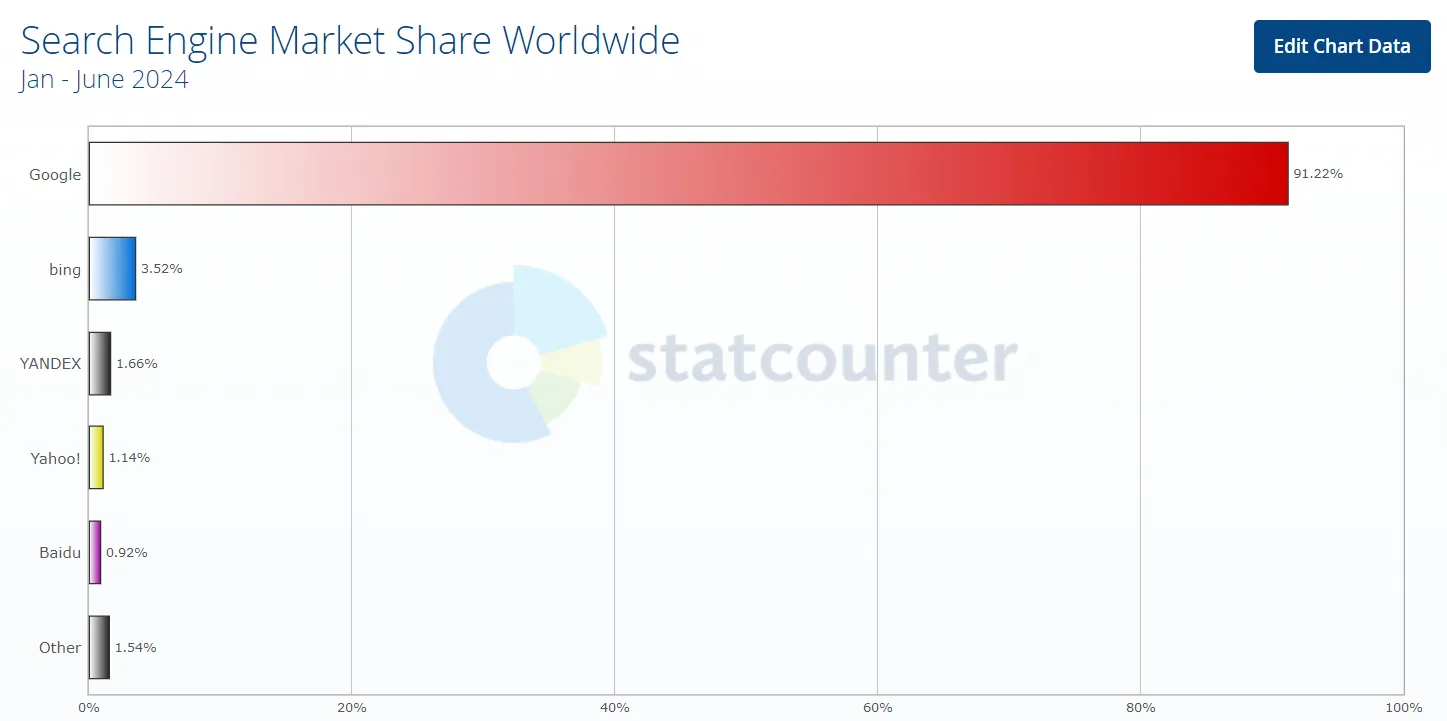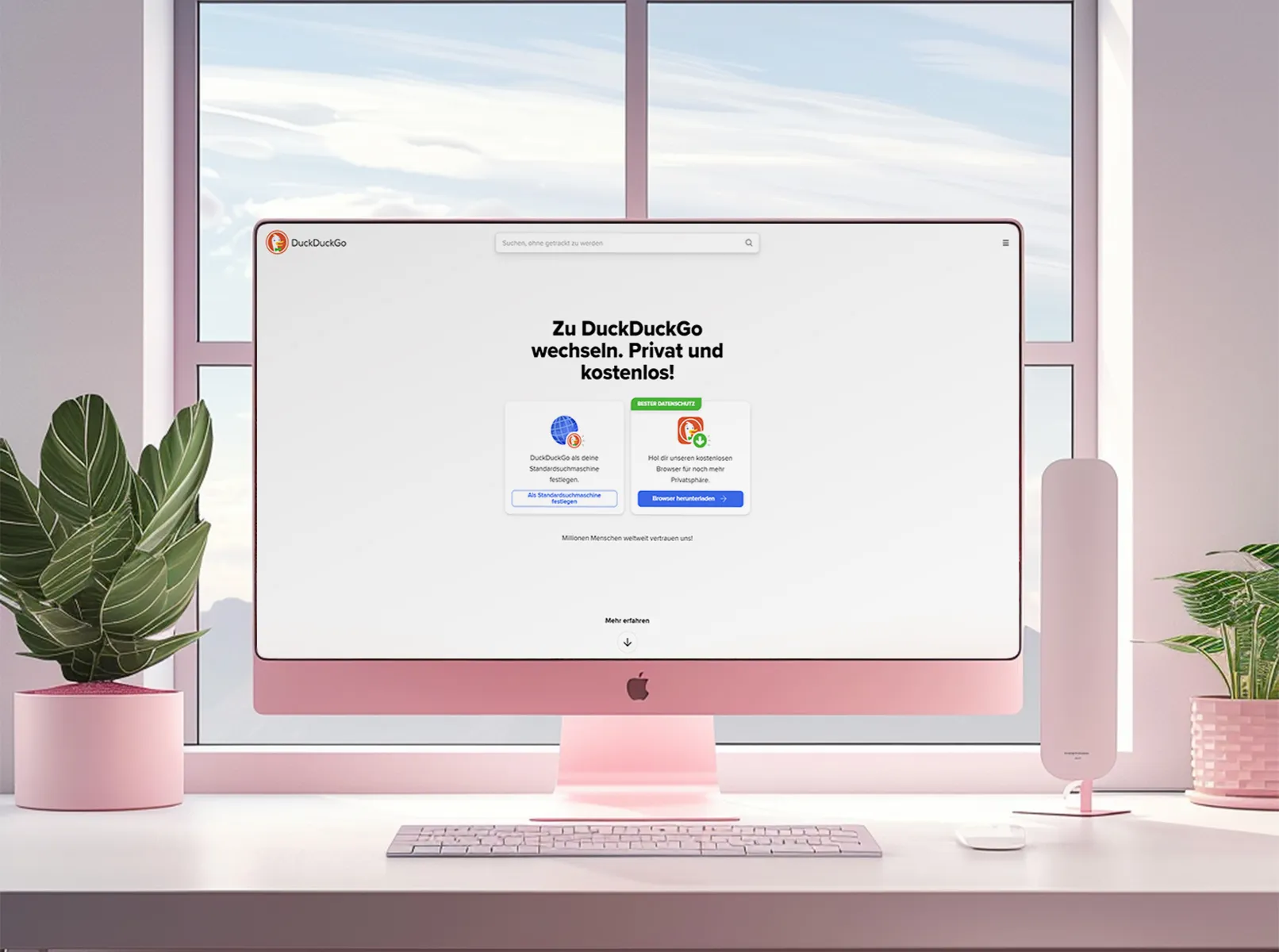For most people, Google is the only search engine they know and use. And indeed, Google is very good. But recently, even Google can no longer satisfy the needs of all users. Due to its focus on certain interests or advertising, you often do not see the information that is relevant to your query, but rather what Google wants to show you.
In this article, I present to you our ranking of the top 10 search engines in the world. This list is subjective and based on our experiences and research. We are happy to share our opinion with you and hope that you discover some interesting alternatives to Google. Let's explore the strengths and special features of these search engines together.
Table of Contents
Google, Actually the Best, but Not the Only One
When we receive a search engine optimization job, no one explicitly asks to rank better in Google. That goes without saying. In almost all free countries in the world, Google is the undisputed market leader. This dominance reflects the quality and reliability of Google, but also underscores how important it is to know and use alternatives.

Google, founded in 1998 by Larry Page and Sergey Brin, is now the dominant force on the internet. With a global market share of over 90%, Google is synonymous with internet search for many. The search engine, accessible at www.google.com, has evolved from a simple search field to a complex ecosystem encompassing numerous services.
Google's strengths lie in the quality and relevance of search results. Thanks to advanced algorithms and a huge database, Google often delivers precise and contextually relevant results. Additionally, it offers powerful tools like image search, translator, and academic search.
An important part of Google's success story is its in-house browser Chrome. Since its introduction in 2008, Chrome has become the most used web browser worldwide. Its popularity is based on speed, simplicity, and seamless integration with other Google services. There is even a popular joke: "Microsoft Edge is the program in Windows that lets you install a decent browser" - underscoring Chrome's dominance.

Google's success is based on a variety of services that have made it indispensable for many users:
- Gmail - one of the most widely used email services
- Google Maps - the gold standard for mapping services and navigation
- Google Drive - cloud storage and collaboration tools
- YouTube - the world's largest video platform
- Google Docs, Sheets, and Slides - free online office suite
- Google Photos - intelligent photo storage and organization
- Google Play Store - the main marketplace for Android apps
These services are seamlessly integrated with each other and with Google Search, creating a comprehensive ecosystem. However, Google is often criticized for its aggressive data collection practices and the personalization of search results, which can lead to so-called "filter bubbles". Despite these concerns, Google remains the top choice for many users due to its efficiency and the breadth of its services.
An interesting fact: The name "Google" is a play on words with the mathematical term "googol," which stands for the number 1 followed by a hundred zeros. This was meant to symbolize the huge amount of information the search engine can process. Today, Google is so ubiquitous that "googling" is used as a verb for "searching on the internet" in many languages.
What is Bing?
Bing was introduced by Microsoft in 2009 as the successor to MSN Search and Live Search. Accessible at www.bing.com, it is Microsoft's response to Google's dominance. Although Bing globally lags behind Google, it has built a significant presence in some markets, especially in the US and the UK.

What is dead may never die.
A Song of Ice and Fire
Bing's strengths include its visual search function and seamless integration with Microsoft products like Office and Windows. Bing often offers beautiful, daily changing background images and a clean user interface. Another plus is the rewards program, where you can earn points for your searches and redeem them for gift cards or donations. One potential drawback is that Bing may provide less precise results in some areas, especially for very specific or technical searches, compared to Google.
Interesting Fact: The name "Bing" was chosen because it is short, memorable, and easy to pronounce. Microsoft wanted a name that symbolizes the "Aha moment" when finding information - similar to the sound of a light bulb turning on (often depicted as "Bing!" in English).
What is Baidu?
Baidu, founded in 2000 by Robin Li, is the dominant search engine in China. Accessible at www.baidu.com, Baidu holds over 80% of the Chinese market share. Baidu's dominance in China is not only based on its quality, but also on the unique internet situation in the country.

China has a closed, sovereign internet, often referred to as the "Great Firewall of China." Many Western services, including Google, are blocked or heavily restricted in China. Google cannot physically operate in China, thus not posing a real competition to Baidu. This situation has allowed Baidu to solidify and expand its dominance in the Chinese market.
The greatest strength of Baidu lies in its expertise in Chinese-language content and its adaptation to local regulations and needs. It provides excellent search results for local services, news, and culturally specific queries in China. Baidu has advanced language and image recognition technologies that are specifically optimized for the Chinese market. A drawback for international users is that Baidu is less effective outside China and its user interface is mainly available in Chinese. Additionally, Baidu, like all Chinese internet services, is subject to the strict internet censorship of the Chinese government.
Interesting Fact: The name "Baidu" comes from a classical Chinese poem. It roughly translates to "search a hundred times" and refers to the search for ideal beauty. Robin Li, the founder of Baidu, developed an algorithm named "RankDex" before Google, which evaluates websites based on their relevance - a technology that later became the core of many search engines.
It will definitely be useful for you to read about free internet speed tests and the best VPN providers. Knowledge is power!
What is Yahoo!?
Yahoo!, founded in 1994 by Jerry Yang and David Filo, was one of the first major web portals and search engines. Accessible at www.yahoo.com, Yahoo! has undergone many changes over the years. Despite no longer possessing the dominance of its early days, Yahoo! remains an important player on the internet, especially in areas like finance and news.
The love for parents is the foundation of all virtues.
Marcus Tullius Cicero
Not only for me, but for millions of people who had access to the internet, Yahoo was the first search engine that really helped find information well. It was also the first mailbox.

Today, Yahoo! uses Bing search technology for its search function but also offers its own services like email, news, and financial data. A strength of Yahoo! is its comprehensive range of services all under one roof. It is particularly popular in Japan, where it operates as a standalone company. One potential drawback is that the actual search function is no longer developed in-house, making it harder to differentiate from other search engines.
Interesting Fact: The name "Yahoo!" is an acronym for "Yet Another Hierarchical Officious Oracle." The founders added the exclamation mark because "Yahoo" was already a trademarked name. In its beginnings, Yahoo! was a manually curated directory of websites before evolving into a full-fledged search engine.
What is Ecosia?
Ecosia, founded in 2009 in Berlin by Christian Kroll, can be found at www.ecosia.org. This unique search engine combines internet searches with environmental conservation. Ecosia uses the revenue from search queries to plant trees and support reforestation projects worldwide.

The main advantage of Ecosia is its ecological approach. For roughly every 45 (although I don't believe that) search queries, a tree is planted. Ecosia is carbon-negative, meaning it removes more CO2 from the atmosphere than it produces through its activities. Search results are based on Bing, supplemented by proprietary algorithms. Ecosia also offers its own browser and extensions for common browsers. A potential drawback is that search quality may not always match that of top search engines, especially for very specific queries.
Search. Plant. Breathe.
A slogan that fits perfectly in this section
Interesting fact: Ecosia publishes its financial reports monthly and shows in real time how many trees have been planted through searches. To this day, Ecosia has planted more than 150 million trees. The name "Ecosia" is a combination of "Eco" for ecology and "sia" as an allusion to other search engine endings.
What is Yandex?
Yandex, founded in 1997 by Arkady Volozh and Ilya Segalovich, is the leading search engine in Russia and some CIS countries. Accessible at yandex.ru, Yandex has evolved into a versatile technology company that offers not only search functions but also email services, mapping services, a browser, and even taxi services.

Yandex could have been a serious alternative to Google, especially in Eastern Europe and Russian-speaking countries. The search engine offers advanced technologies and a wide range of services that can compete with Google in many aspects. Yandex's main strength lies in its specialization in the Russian-speaking world. It provides excellent local search results and services for Russian-speaking users, including precise navigation and traffic information in Russian cities.
However, political developments and controversies have significantly limited Yandex's potential as a global alternative. After the Russian invasion of Ukraine in 2022, sanctions were imposed on Russia, affecting Yandex as well. Additionally, there have been reports of sharing confidential user data with Russian authorities. These incidents have greatly impacted trust in Yandex outside of Russia.
The lack of transparency, close ties to government agencies, and potential manipulation of search results raise serious questions about user data security, privacy, and freedom of information.
Interesting fact: The name "Yandex" stands for "Yet Another iNDEXer." The company was a pioneer in the development of morphological linguistics for search engines, which is particularly important for the complex Russian language. Yandex was also one of the first search engines to introduce context-based advertising, even before Google AdWords.
What is DuckDuckGo?
DuckDuckGo, founded in 2008 by Gabriel Weinberg, is accessible at duckduckgo.com. This search engine has positioned itself as a privacy-friendly alternative to the major tech giants. DuckDuckGo promises not to collect or store personal information and offers all users the same, non-personalized search results.

The main advantage of DuckDuckGo is its strong focus on privacy. It does not track your search history and does not show targeted ads. The search results are free from personalized filter bubbles, which can contribute to a more objective information search. DuckDuckGo also offers useful features like "!bangs," which allow you to search directly on other websites. One potential drawback is that the accuracy and depth of search results may sometimes lag behind those of Google, especially in very specific or local searches.
Interesting fact: The name "DuckDuckGo" comes from the children's game "Duck, Duck, Goose." Weinberg chose the name because it is memorable and playful. Despite its relatively small size compared to Google, DuckDuckGo has built a loyal user base and receives over 100 million search queries daily.
What is Qwant?
Qwant is a French search engine founded in 2013 by Eric Leandri, Jean-Manuel Rozan, and Patrick Constant. Accessible at www.qwant.com, Qwant positions itself as a European alternative to the American tech giants, with a strong focus on privacy and neutrality.

The main strength of Qwant lies in its commitment to protecting the privacy of its users. It does not collect personal data or personalize search results. Qwant offers a clear user interface and categorizes search results into areas such as web, news, social media, and images. It is particularly popular in France and is recommended by the French government as the preferred search engine for public institutions. One potential drawback is that search results may sometimes be less comprehensive than those of larger competitors, especially in very specific or local searches outside of Europe.
Interesting fact: The name "Qwant" was chosen because it is short, memorable, and easy to pronounce in many languages. The "Q" stands for Questions and "want" for the desire for answers. Qwant also has a special version for children called "Qwant Junior", which provides child-friendly and safe search results.
What is Startpage?
Startpage, formerly known as Ixquick, was founded in 1998 and can be found at www.startpage.com. This search engine positions itself as the "most private search engine in the world" and offers a unique combination of Google search results and increased data protection.

The main advantage of Startpage lies in its ability to deliver Google search results without collecting or sharing personal data. It acts as a proxy between the user and Google, removes all personal identifying information, and thus prevents tracking. Startpage also offers an "Anonymous View" mode that allows browsing websites anonymously. One possible disadvantage is the lack of some Google-specific features and personalized services.
Yeah, well, I'm gonna go build my own theme park. With blackjack and hookers! In fact forget the park.
futurama
Interesting fact: Startpage was the first search engine to introduce SSL encryption by default for all search queries. The company is based in the Netherlands and is subject to strict European data protection laws. Startpage annually awards the "Startpage Privacy Protection Award" to individuals or organizations that advocate particularly for data protection.
What is Brave Search?
Brave Search, introduced in 2021 by the Brave Browser team, can be accessed at search.brave.com. It is part of the Brave ecosystem, which focuses on privacy and security on the Internet. Brave Search promises independent search results without tracking or profiling.

The main strength of Brave Search lies in its dedication to privacy and transparency (which is not surprising). It builds its own search index instead of relying on third-party results. This enables Brave to provide independent and unbiased search results. The search engine does not collect personal data or create user profiles, making it an attractive option for privacy-conscious users.
Brave Search offers some innovative features. This includes "Goggles," a tool that allows users to create and share their own search filters. This promotes transparency and gives users more control over their search results. Additionally, Brave Search seamlessly integrates with the Brave Browser, providing a cohesive and secure browsing experience.
A potential drawback of Brave Search is that as a relatively new search engine, it may not yet offer the depth and breadth of search results as more established competitors. Localization and result personalization may also be less mature. However, the service is constantly improving and gaining popularity among privacy-conscious users.
Interesting fact: Brave was co-founded by Brendan Eich, who is also the inventor of JavaScript and co-founder of Mozilla Firefox. The company aims to "fix" the Internet by giving users more control over their data and online experience.
Is there life beyond Google?
Indeed, yes! Our overview shows that there are real alternatives. Every search engine offers unique advantages, whether it's improved privacy, environmental protection, or regional expertise. This diversity fosters competition and drives innovation. While Google remains dominant, these alternatives force the search giant to constantly improve. Ultimately, we as users benefit from this healthy competition, which gives us more choices and better services.

